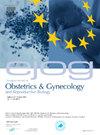印尼版月经困扰问卷(MEDI-Q)的验证:一项信度研究
IF 2.1
4区 医学
Q2 OBSTETRICS & GYNECOLOGY
European journal of obstetrics, gynecology, and reproductive biology
Pub Date : 2025-04-24
DOI:10.1016/j.ejogrb.2025.113996
引用次数: 0
摘要
月经是发生在女性身上的自然生理过程。月经周期显著影响女性的生理和心理健康。从调查中获得的数据表明,不应低估由痛经引起的月经窘迫的负担。在对385名印度尼西亚妇女进行的一项调查中,79.2%的妇女报告说,痛经对她们的日常活动造成了重大负担。鉴于其相当大的影响,在临床实践中评估与月经周期相关的痛苦程度是必不可少的。月经困扰问卷(MEDI-Q)是一种经验证的全面评估月经相关困扰的工具。由于印度尼西亚目前没有有效的测量月经痛苦的仪器,因此在讲印度尼西亚语的人群中验证印度尼西亚版的MEDI-Q对于其更广泛的采用和使用至关重要。研究设计问卷进行正向和反向翻译。印尼版的MEDI-Q分发给19-49岁的妇女。参与者采用连续抽样方法招募,并完成两次问卷,每次完成间隔两周。使用类内相关系数(ICC)评估重测信度,而使用Cronbach 's alpha确定内部一致性。结果共纳入53例患者,平均年龄26.17±4.78岁。首次和后续测试的平均MEDI-Q总分分别为8.79±9.11和10.64±11.68。被试回答的ICC为0.892,Cronbach’s alpha系数为0.972。结论印文版MEDI-Q量表具有良好的重测信度和内部一致性。结果表明,印尼语版的MEDI-Q可用于临床和研究。本文章由计算机程序翻译,如有差异,请以英文原文为准。
Validation of the Indonesian version of the Menstrual Distress Questionnaire (MEDI-Q): A reliability study
Background
Menstruation is a natural biological process that occurs in women. The menstrual cycle significantly affects women’s physical and psychological well-being. Data obtained from surveys indicates that the burden of menstrual distress resulting from dysmenorrhea should not be underestimated. In a survey conducted with 385 Indonesian women, 79.2% reported experiencing a significant burden on their daily activities due to dysmenorrhea. In light of its considerable impact, it is essential to evaluate the level of distress associated with the menstrual cycle within clinical practice. The Menstrual Distress Questionnaire (MEDI-Q) is an instrument that has been validated for the comprehensive assessment of menstrual-related distress.
Objectives
With no validated instruments currently available in Indonesia for measuring menstrual distress, validating the Indonesian version of the MEDI-Q within the Indonesian-speaking population is essential for its wider adoption and utility.
Study design
The questionnaire underwent forward and backward translation. The Indonesian version of MEDI-Q is distributed to women aged 19–49. Participants were recruited using a consecutive sampling method and completed the questionnaire twice, with a two-week interval between each completion. Test-retest reliability is evaluated using the Intraclass Correlation Coefficient (ICC), while internal consistency is determined using Cronbach’s alpha.
Results
The study included 53 participants, with a mean age of 26.17 ± 4.78. The mean MEDI-Q total scores for the initial and subsequent tests are 8.79 ± 9.11 and 10.64 ± 11.68, respectively. The ICC of the participant’s responses is 0.892, while Cronbach’s alpha coefficient is 0.972.
Conclusion
The Indonesian version of MEDI-Q exhibits good test–retest reliability and internal consistency. The results demonstrate that the Indonesian version of the MEDI-Q can be utilized in clinical and research settings.
求助全文
通过发布文献求助,成功后即可免费获取论文全文。
去求助
来源期刊
CiteScore
4.60
自引率
3.80%
发文量
898
审稿时长
8.3 weeks
期刊介绍:
The European Journal of Obstetrics & Gynecology and Reproductive Biology is the leading general clinical journal covering the continent. It publishes peer reviewed original research articles, as well as a wide range of news, book reviews, biographical, historical and educational articles and a lively correspondence section. Fields covered include obstetrics, prenatal diagnosis, maternal-fetal medicine, perinatology, general gynecology, gynecologic oncology, uro-gynecology, reproductive medicine, infertility, reproductive endocrinology, sexual medicine and reproductive ethics. The European Journal of Obstetrics & Gynecology and Reproductive Biology provides a forum for scientific and clinical professional communication in obstetrics and gynecology throughout Europe and the world.

 求助内容:
求助内容: 应助结果提醒方式:
应助结果提醒方式:


